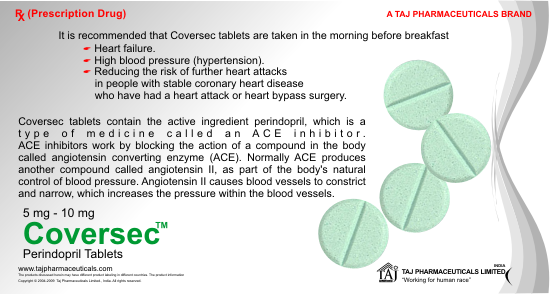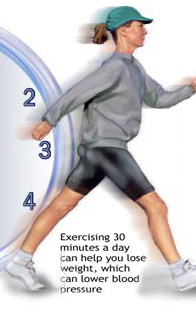|
|
Indication
Coversec tablets contain the active ingredient perindopril, which
is a type of medicine called an ACE inhibitor. (NB. Perindopril is
also available without a brand name, i.e. as the generic medicine.)
ACE inhibitors work by blocking the action of a compound in the
body called angiotensin converting enzyme (ACE). Normally ACE
produces another compound called angiotensin II, as part of the
body's natural control of blood pressure. Angiotensin II causes
blood vessels to constrict and narrow, which increases the
pressure within the blood vessels.
As perindopril blocks the action of ACE, it reduces the production
of angiotensin II. This means that the blood vessels are allowed
to relax and widen. The overall effect of this is a drop in blood
pressure, hence perindopril can be used to lower high blood
pressure.
The reduced pressure within the blood vessels means that the heart
doesn't have to work as hard to pump the blood around the body.
This means that ACE inhibitors can be used to improve the symptoms
of heart failure, where the heart is not pumping as efficiently,
and to improve survival following a heart attack.
It is recommended that Coversec tablets are taken in the morning
before breakfast.
What is it used for?
* Heart failure.
* High blood pressure (hypertension).
* Reducing the risk of further heart attacks in people with stable
coronary heart disease who have had a heart attack or heart bypass
surgery.
Warning
Coversec tablets contain a different salt of perindopril to the
old Coversec tablets (perindopril arginine instead of perindopril
tert-butylamine). This new salt has an extended shelf-life and
greater stability. Coversec is equivalent to the old Coversec in
terms of safety and effectiveness, and the action of the medicine
has not changed. However, the new tablets come in different
packaging and in different strengths to the old Coversec tablets.
Coversec 2.5mg tablets are equivalent to the old Coversec 2mg
tablets. Coversec 5mg tablets are equivalent to the old Coversec
4mg tablets and Coversec 10mg tablets are equivalent to the old
Coversec 8mg tablets. Generic perindopril tablets remain
available; these contain the tert-butylamine salt. Coversec 2.5mg
tablets are equivalent to generic perindopril 2mg tablets.
Coversec 5mg tablets are equivalent to generic perindopril 4mg
tablets and Coversec 10mg tablets are equivalent to generic
perindopril 8mg tablets. If you have any questions or concerns
about this change you should talk to your pharmacist.
Some people may experience dizziness caused by low blood pressure
in the first few days of taking this medicine and in particular
the first dose. For this reason, the first dose should preferably
be taken at bedtime. Your doctor may want you to take the first
dose of this medicine under medical supervision in hospital if you
are aged over 70 years, have low blood pressure, low levels of
fluids or salt in your blood (eg due to dehydration), severe or
unstable heart failure, kidney problems, or are taking high doses
of diuretic medicines, multiple diuretic medicines, or certain
other medicines that dilate your blood vessels.
Alcohol may enhance the blood pressure lowering effect of this
medicine, which can increase dizziness and may increase the risk
of fainting.
ACE inhibitors can sometimes cause an allergic reaction called
angioedema. Stop taking this medicine and consult your doctor
immediately if you experience difficulty breathing or swallowing,
or swelling of your face, lips, tongue, throat, hands, feet or
ankles while taking this medicine. This type of allergic reaction
has been reported more frequently in people of Afro-Caribbean
origin.
Your blood pressure, kidney function and the amount of potassium
in your blood should be regularly monitored while you are taking
this medicine.

Use with caution in
* Elderly people.
* Decreased liver function.
* Decreased kidney function.
* Narrowing of the arteries that supply blood to the kidneys
(renal artery stenosis).
* High blood pressure caused by compression or blockage of the
arteries that carry blood to the kidneys (renovascular
hypertension).
* People with low fluid volume or salt levels in the body, eg due
to diuretic therapy, low-sodium diet, diarrhoea or vomiting.
* People taking other medicines for high blood pressure,
particularly diuretics (see end of factsheet).
* People with hardening of the arteries (athersclerosis) in the
heart (cardiovascular disease), brain (cerebrovascular disease) or
legs (peripheral vascular disease).
* Narrowing of the main artery of the body (aortic stenosis).
* Heart valve disease (mitral valve stenosis).
* Heart disease characterised by thickening of the internal heart
muscle and a blockage inside the heart (hypertrophic obstructive
cardiomyopathy).
* Diseases affecting connective tissue, eg scleroderma, systemic
lupus erythematosus or rheumatoid arthritis (collagen vascular
diseases).
* Diabetes.
* People with kidney failure requiring a certain type of
haemodialysis (high-flux membrane).
* People undergoing therapy to decrease allergy to bee or wasp
stings (desensitisation).
* People receiving therapy to remove certain types of fat from the
blood using a machine (LDL apheresis).
Not to be used in
* Allergy to other ACE inhibitor medicines.
* History of swelling of the lips, face or tongue (angioedema)
with no known cause, or caused by previous use of an ACE inhibitor
medicine.
* Hereditary angioedema (angioneurotic oedema).
* Pregnancy.
* Breastfeeding.
* Rare hereditary problems of galactose intolerance, glucose-galactose
malabsorption, or the Lapp lactase deficiency (Coversec tablets
contain lactose).
* The safety and efficacy of this medicine in children have not
been studied. It is not recommended for children.
This medicine should not be used if you are allergic to one or any
of its ingredients. Please inform your doctor or pharmacist if you
have previously experienced such an allergy.If you feel you have
experienced an allergic reaction, stop using this medicine and
inform your doctor or pharmacist immediately.
Side effects
Common
* Headache.
* Pins and needles sensations.
* Low blood pressure (hypotension).
* Dizziness.
* Visual disturbances.
* Sensation of ringing or other noise in the ears (tinnitus).
* Dry cough.
* Shortness of breath.
* Disturbances of the gut such as diarrhoea, constipation,
indigestion, nausea, vomiting or abdominal pain.
* Alteration in taste.
* Rash or itching.
* Muscle cramps.
* Feeling of weakness.
Presentation
Coversec Tablets
Blister of 10 Tablets
|
|





